-
 Bitcoin
Bitcoin $114200
0.00% -
 Ethereum
Ethereum $3637
0.56% -
 XRP
XRP $2.950
-2.01% -
 Tether USDt
Tether USDt $0.9999
0.02% -
 BNB
BNB $761.0
0.55% -
 Solana
Solana $164.1
-1.38% -
 USDC
USDC $0.9999
0.02% -
 TRON
TRON $0.3332
0.36% -
 Dogecoin
Dogecoin $0.2012
-0.52% -
 Cardano
Cardano $0.7261
-1.41% -
 Hyperliquid
Hyperliquid $37.62
-2.13% -
 Stellar
Stellar $0.3930
-2.65% -
 Sui
Sui $3.441
-0.16% -
 Bitcoin Cash
Bitcoin Cash $563.8
0.70% -
 Chainlink
Chainlink $16.50
0.09% -
 Hedera
Hedera $0.2424
-0.14% -
 Ethena USDe
Ethena USDe $1.001
0.01% -
 Avalanche
Avalanche $22.20
0.00% -
 Litecoin
Litecoin $118.0
-2.48% -
 UNUS SED LEO
UNUS SED LEO $8.991
0.12% -
 Toncoin
Toncoin $3.195
-3.87% -
 Shiba Inu
Shiba Inu $0.00001217
0.12% -
 Uniswap
Uniswap $9.674
-0.21% -
 Polkadot
Polkadot $3.633
1.00% -
 Monero
Monero $295.3
-0.82% -
 Dai
Dai $0.9999
0.00% -
 Bitget Token
Bitget Token $4.321
-0.41% -
 Cronos
Cronos $0.1392
0.73% -
 Pepe
Pepe $0.00001027
-0.89% -
 Aave
Aave $258.5
0.32%
How can a novice buy Bitcoin and make a quick profit? What is the most cost-effective way to buy?
Bitcoin is the first decentralized cryptocurrency, traded on platforms like Coinbase and Binance, with strategies like day trading and arbitrage used for quick profits.
Jun 04, 2025 at 07:07 pm
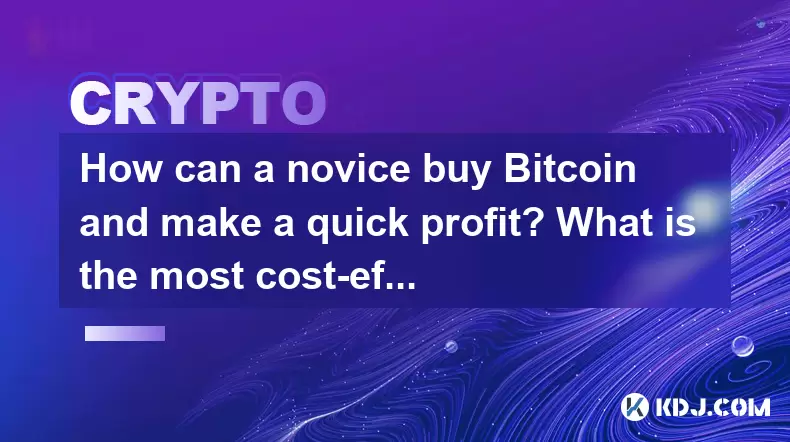
Understanding Bitcoin and the Basics of Cryptocurrency Trading
Before diving into the specifics of buying Bitcoin and aiming for quick profits, it's essential to grasp the fundamentals of what Bitcoin is and how the cryptocurrency market functions. Bitcoin is the first and most well-known cryptocurrency, operating on a decentralized network called the blockchain. It allows users to send and receive payments without the need for traditional financial intermediaries like banks. The cryptocurrency market, including Bitcoin, is known for its volatility, which can present opportunities for profit but also significant risks.
Choosing the Right Platform to Buy Bitcoin
To begin your journey in buying Bitcoin, you must first select a reliable platform. There are several types of platforms available, including centralized exchanges, decentralized exchanges, and peer-to-peer (P2P) marketplaces.
Centralized Exchanges: These are the most common platforms for beginners. Examples include Coinbase, Binance, and Kraken. They offer user-friendly interfaces and a variety of payment methods, such as bank transfers, credit cards, and even PayPal in some cases.
Decentralized Exchanges: These platforms, like Uniswap, operate without a central authority and allow for direct trading between users. They are often preferred for their privacy and security features but can be more complex for beginners.
Peer-to-Peer Marketplaces: Platforms like LocalBitcoins enable direct trading between individuals. This can be a cost-effective method as it often bypasses the fees of centralized exchanges, but it requires more diligence to ensure safe transactions.
Cost-Effective Ways to Buy Bitcoin
When considering the most cost-effective way to buy Bitcoin, you should focus on minimizing fees and maximizing the amount of Bitcoin you can purchase with your money. Here are some strategies:
Using Bank Transfers: Most exchanges offer the lowest fees when you deposit funds via bank transfer. While this method can take longer to process, it often results in significant savings on transaction fees.
Avoiding Credit Card Purchases: Buying Bitcoin with a credit card is convenient but typically incurs higher fees. If you're aiming for cost-effectiveness, it's better to avoid this method.
Trading on Low-Fee Exchanges: Some exchanges, like Binance, offer lower trading fees than others. Researching and choosing an exchange with competitive fees can help you buy more Bitcoin for your money.
Utilizing P2P Platforms: As mentioned, P2P platforms can sometimes offer the lowest prices because they cut out the middleman. However, you must be cautious and verify the credibility of the seller.
Strategies for Making Quick Profits with Bitcoin
Once you have purchased Bitcoin, the next step is to devise a strategy for making quick profits. Here are some approaches that traders often use:
Day Trading: This involves buying and selling Bitcoin within the same day to take advantage of short-term price movements. It requires constant monitoring of the market and a good understanding of technical analysis.
Swing Trading: This strategy involves holding onto Bitcoin for a few days to a few weeks to capitalize on expected upward or downward market swings. It's less time-intensive than day trading but still requires a solid grasp of market trends.
Arbitrage: This involves buying Bitcoin on one exchange where it's cheaper and selling it on another where it's more expensive. This method can be profitable but requires quick action and access to multiple exchanges.
Risk Management and Safe Trading Practices
Making quick profits with Bitcoin can be tempting, but it's crucial to approach trading with caution. Here are some risk management practices to keep in mind:
Set Stop-Loss Orders: These are orders that automatically sell your Bitcoin if its price drops to a certain level, helping to limit potential losses.
Diversify Your Investments: Don't put all your money into Bitcoin. Consider spreading your investments across different cryptocurrencies to mitigate risk.
Educate Yourself: Continuously learning about the market and staying updated on news can help you make more informed trading decisions.
Only Invest What You Can Afford to Lose: Given the volatility of the cryptocurrency market, it's wise to only invest money that you can afford to lose without impacting your financial stability.
Executing a Bitcoin Purchase: A Step-by-Step Guide
To help you get started, here's a detailed guide on how to buy Bitcoin using a centralized exchange like Coinbase:
Create an Account: Visit the Coinbase website and sign up for an account. You'll need to provide your email address, create a password, and agree to their terms of service.
Verify Your Identity: Most exchanges require you to verify your identity to comply with anti-money laundering (AML) and know your customer (KYC) regulations. You'll need to provide personal information and upload a government-issued ID.
Add a Payment Method: Once your account is verified, you can add a payment method. Choose between a bank account, credit card, or other supported methods.
Deposit Funds: Transfer money into your Coinbase account. If using a bank transfer, this might take a few days to process.
Buy Bitcoin: Navigate to the trading section of Coinbase, select Bitcoin, enter the amount you wish to buy, and complete the transaction. You can choose to buy at the current market price or set a limit order to buy at a specific price.
Secure Your Bitcoin: After purchasing, you can either leave your Bitcoin in your Coinbase wallet or transfer it to a private wallet for added security. If transferring to a private wallet, you'll need to provide the wallet address and confirm the transaction.
Frequently Asked Questions
Can I buy Bitcoin without a bank account?
Yes, it's possible to buy Bitcoin without a bank account using alternative methods such as cash through P2P platforms or prepaid cards on certain exchanges. However, these methods may come with higher fees and additional risks.How much Bitcoin should I buy to start trading?
The amount of Bitcoin you should buy depends on your investment goals and risk tolerance. Some traders start with as little as $10 to get familiar with the process, while others may invest more. It's important to start small and only invest what you can afford to lose.Is it safe to store Bitcoin on an exchange?
Storing Bitcoin on an exchange can be convenient for trading, but it comes with risks. Exchanges can be hacked, and you might lose access to your funds. For long-term storage, it's generally safer to transfer your Bitcoin to a private wallet, especially a hardware wallet, which offers the highest level of security.How do I know if a Bitcoin trading platform is reputable?
To determine if a Bitcoin trading platform is reputable, look for user reviews, check if it's regulated by financial authorities, and see if it has a strong track record of security and customer service. Platforms with transparent fee structures and robust security measures are generally more trustworthy.
Disclaimer:info@kdj.com
The information provided is not trading advice. kdj.com does not assume any responsibility for any investments made based on the information provided in this article. Cryptocurrencies are highly volatile and it is highly recommended that you invest with caution after thorough research!
If you believe that the content used on this website infringes your copyright, please contact us immediately (info@kdj.com) and we will delete it promptly.
- Brazil, Bitcoin, Hearing Date: Is Brazil About to Embrace Bitcoin?
- 2025-08-06 20:30:38
- Stabull DEX on Base Chain: A New Era for Stablecoins?
- 2025-08-06 20:47:53
- WeWake Finance: Is This the Crypto ROI Opportunity You've Been Waiting For?
- 2025-08-06 21:10:18
- PancakeSwap, US Stocks, and Perpetual Contracts: A New Frontier in DeFi
- 2025-08-06 21:10:18
- South Korea, Stablecoins, and Online Banks: KakaoBank's Bold Move
- 2025-08-06 20:47:53
- Crypto, ASEAN, and the Philippines: Web3's Rising Star?
- 2025-08-06 21:55:07
Related knowledge
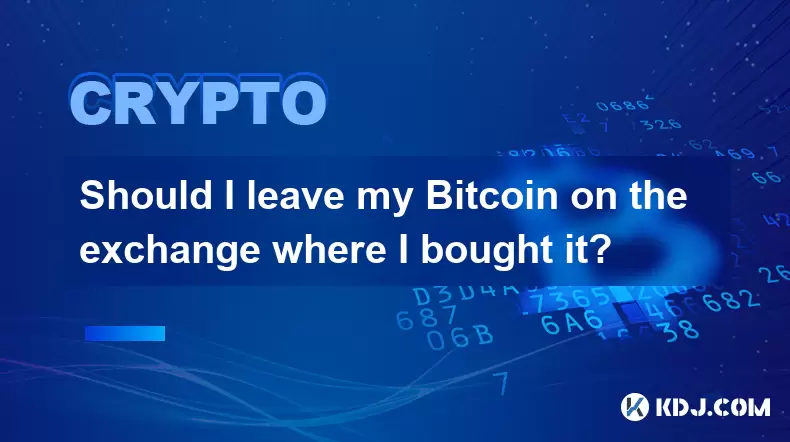
Should I leave my Bitcoin on the exchange where I bought it?
Aug 04,2025 at 06:35am
Understanding the Role of Smart Contracts in Decentralized Finance (DeFi)Smart contracts are self-executing agreements with the terms directly written...
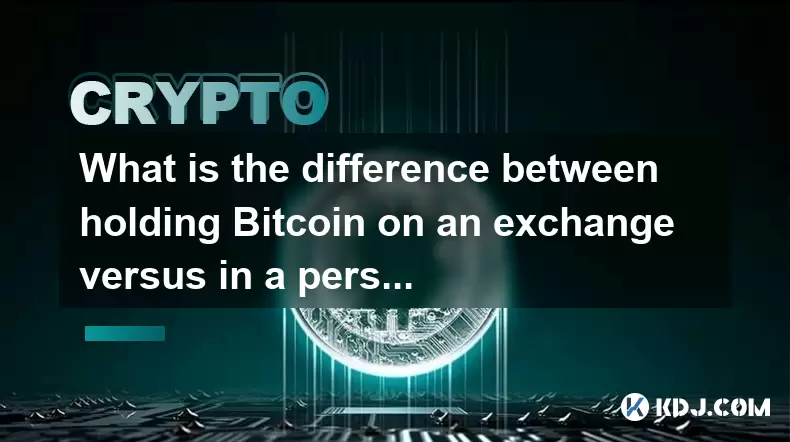
What is the difference between holding Bitcoin on an exchange versus in a personal wallet?
Aug 02,2025 at 03:15pm
Understanding Custodial vs Non-Custodial ControlWhen holding Bitcoin on an exchange, users are essentially entrusting their assets to a third party. E...

What is the environmental impact of Bitcoin mining, and is it a serious concern?
Aug 04,2025 at 02:14am
Understanding the Energy Consumption of Bitcoin MiningBitcoin mining relies on a proof-of-work (PoW) consensus mechanism, which requires miners to sol...

What is a 51% attack, and could it destroy Bitcoin?
Aug 03,2025 at 05:08pm
Understanding the Concept of a 51% AttackA 51% attack refers to a scenario in which a single entity or group gains control of more than half of a bloc...
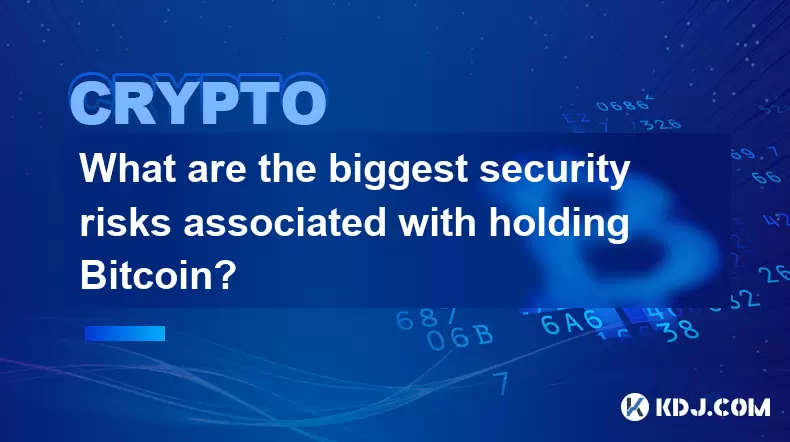
What are the biggest security risks associated with holding Bitcoin?
Aug 03,2025 at 03:16pm
Exposure to Private Key CompromiseOne of the most critical security risks when holding Bitcoin is the compromise of private keys. These cryptographic ...
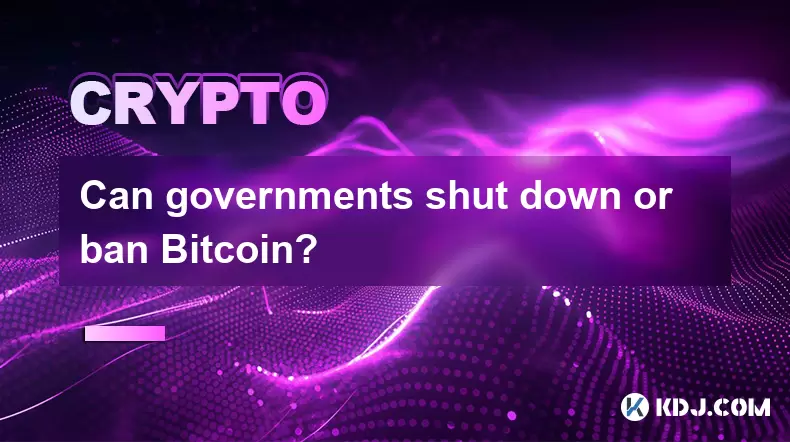
Can governments shut down or ban Bitcoin?
Aug 02,2025 at 09:44am
Understanding Bitcoin’s Decentralized StructureBitcoin operates on a decentralized peer-to-peer network, meaning it is not controlled by any single en...

Should I leave my Bitcoin on the exchange where I bought it?
Aug 04,2025 at 06:35am
Understanding the Role of Smart Contracts in Decentralized Finance (DeFi)Smart contracts are self-executing agreements with the terms directly written...

What is the difference between holding Bitcoin on an exchange versus in a personal wallet?
Aug 02,2025 at 03:15pm
Understanding Custodial vs Non-Custodial ControlWhen holding Bitcoin on an exchange, users are essentially entrusting their assets to a third party. E...

What is the environmental impact of Bitcoin mining, and is it a serious concern?
Aug 04,2025 at 02:14am
Understanding the Energy Consumption of Bitcoin MiningBitcoin mining relies on a proof-of-work (PoW) consensus mechanism, which requires miners to sol...

What is a 51% attack, and could it destroy Bitcoin?
Aug 03,2025 at 05:08pm
Understanding the Concept of a 51% AttackA 51% attack refers to a scenario in which a single entity or group gains control of more than half of a bloc...

What are the biggest security risks associated with holding Bitcoin?
Aug 03,2025 at 03:16pm
Exposure to Private Key CompromiseOne of the most critical security risks when holding Bitcoin is the compromise of private keys. These cryptographic ...

Can governments shut down or ban Bitcoin?
Aug 02,2025 at 09:44am
Understanding Bitcoin’s Decentralized StructureBitcoin operates on a decentralized peer-to-peer network, meaning it is not controlled by any single en...
See all articles

























































































